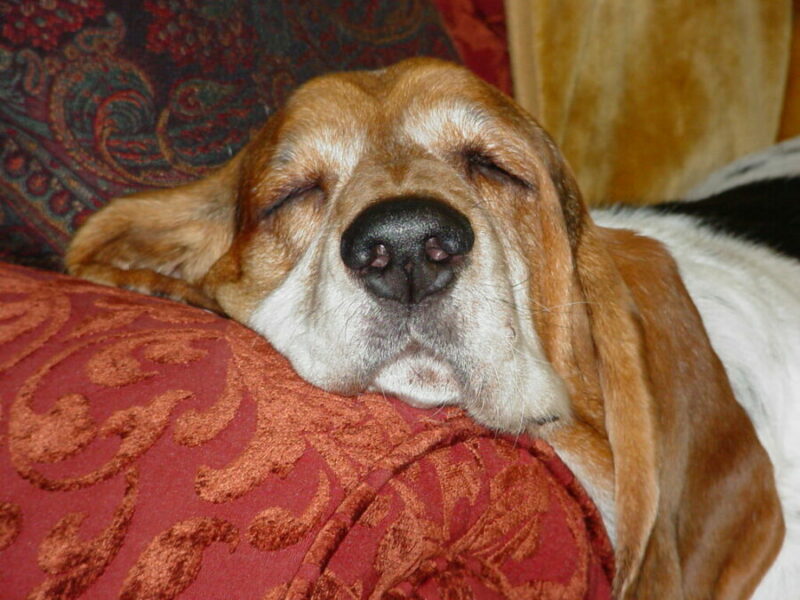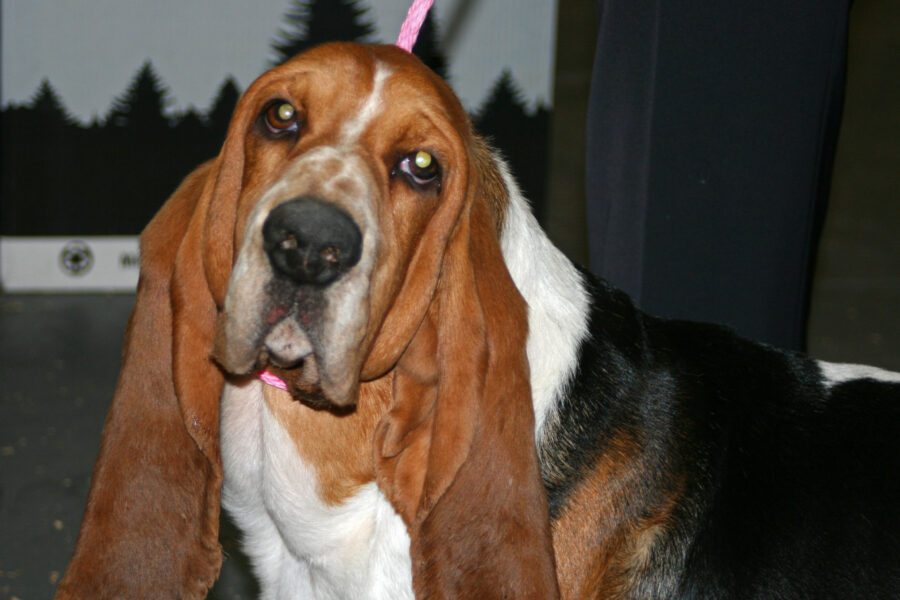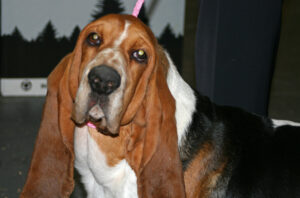Like humans, Basset Hounds snore too. It might be cute at the beginning, but their loud snoring can quickly become irritable and can keep you awake all night. There are some ways to find out if your Basset hound’s snore indicates an underlying health problem or if he’s just a noisy sleeper.
Is It Normal For Basset Hounds To Snore?

It is completely normal for a Basset Hound to snore because of their body build combined with a sleeping position that puts pressure on the airways and blocks them. However, there are some more serious scenarios where the Basset Hound starts to snore when he is sick, starts a new medication, or has allergies and this condition has to be addressed.
Snoring is a result of a narrowed airway that becomes obstructed when the dog relaxes its throat muscles while sleeping. Dogs with longer muzzles tend to be more likely to suffer from this ailment than breeds with shorter noses because their noses are more prone to collapsing occasionally and blocking the airway passage.
Basset Hounds have floppy ears and long noses, both of which contribute to their propensity for snoring. Not only is the shape of their heads conducive to snoring, but these breeds also tend to be a bit overweight which adds additional pressure on their airways. Furthermore, loose muscles paralyze the throat while they sleep so air passes through with strain, causing a vibratory sound.
This makes breathing difficult and disturbs even the lightest sleeper. Though it can be an annoyance at times, owners often find comfort in this familiar habit as it allows them to feel connected to their beloved pooch while they rest.
9 Most Common Causes of Basset Hounds Snoring
Many Basset Hound owners wonder ”Is it normal for Basset Hounds to snore?” This is not a simple question to answer because there is more to it. Basset Hounds can turn into a loud snoring machine when they are sick, or simply because they fell asleep on their backs. Here are the 9 most common causes of Basset Hounds snoring:
1. Sleeping position
Basset Hounds that sleep on their back have a greater chance to become an expert in snoring than those who sleep curled up. When it comes to sleeping positions, dogs are the same as humans. If your Basset Hound sleeps on his back, his tongue and lower jaw will recede and will apply extra pressure on the airway. This extra pressure on the airway means that the Basset will now struggle to get air which will result in snoring. The greater the pressure, the louder the snoring.
2. Medication
Medications like muscle relaxants and painkillers can cause your Basset Hound to snore. These drugs tend to relax the Basset Hound so much that their throat muscles loosen up and cause snoring. So, if your Basset Hound has started to take acepromazine, diazepam, alprazolam, fluoxetine, clomipramine, trazodone, and dexmedetomidine, and starts snoring, it’s because of the medication. It might not be wise to stop the medication, but you can talk to the veterinarian and ask if he can prescribe a substitute for the medication.
3. Common Cold
Same as humans, Basset Hounds can get the common cold too. If your Basset Hound snores due to sniffles, it will stop once he is feeling better. Irritation and inflammation will cause your Basset Hound to sneeze, to wheeze, have a runny nose, and snore. When a Basset Hound gets the common cold, the mucous membranes get inflamed and swollen, and block the dog’s airways, thus causing the Basset to snore. So, If your Basset Hound started to snore and has a runny nose and sneezes all the time, it’s because he is cold. The snoring will go away once the cold passes.
4. Allergies
Basset Hounds can have sensitivities to irritants and develop allergies to many of the same things humans do, including pollen, dust, dander, and perfume which can lead to inflammation of the nasal passages and snoring. Basically, snoring occurs when there is something blocking the airway. The inflammation that occurs because of allergies is great enough to make your Basset hound snore while sleeping.
You should also pay attention to the irritants in the environment because they can also lead to inflammation of the nasal passages. Pay attention to which type of carpet cleaners, laundry detergent, and household cleaners you are using. Some of them might be causing your Basset to snore.
5. Overweight
If your Basset Hound is struggling with some extra pounds or extra tissue in his throat, there is a greater chance that it can constrict airways, or the rings in his trachea can constrict or collapse when he’s asleep. Obesity causes more harm than snoring, which is good enough for any Basset Hound to lose those extra pounds.
When a Basset Hound is overweight, he has enlarged nasal and pharyngeal tissue which presses on the airways. Basset hounds are prone to being overweight. It is very important that you educate yourself on how to feed your Basset hound appropriately for his age. The older the Basset hound gets, the less food he requires. This is because they will reduce their physical activities when they get older. Eating the same amount of calories as a young and physically active Basset hound will lead to extra pounds.
6. Cigarette Smoke
The smoke from the cigarettes can damage the Basset hound’s respiratory system, leading to snoring, asthma, and bronchitis. The smoke isn’t just bad for the people. So, is it normal for Basset Hounds to snore? Yes, If you are a smoker and you have a Basset Hound living with you, you should know that each cigarette that you smoke causes damage to the Basset’s respiratory system.
Did you know that Basset Hounds that are exposed to second-hand smoke suffer from eye infections, allergies, and respiratory issues more than dogs that are not exposed to second-hand smoke? Now is a great time to stop smoking.
7. Hypothyroidism
The most over-diagnosed endocrine disorder – hypothyroidism not only affects the Basset Hound’s metabolism, but also results in reduced activity, weight gain, a lower ability to tolerate the cold, and snoring. Hypothyroidism is when the Basset Hounds gland doesn’t produce enough hormone that controls the metabolism. This medical condition has to be addressed as soon as possible. It is not an expensive fix, but you will have to keep your Basset hound on medication for the rest of its life.
8. An Abscessed Tooth or Throat Infection
This medical condition is not very common in the Basset Hound breed, but it is another possible reason for snoring. An abscessed tooth can block the airways and cause your Basset hound to snore. The same goes for the throat infection. If your Basset’s throat is infected, it will become larger and will block the airway causing your Basset to snore loudly.
9. Physical Obstruction
Basset Hounds are types of dogs that will chew on anything. That’s how they keep their teeth healthy. But, not all dog toys can withstand their strong teeth and a piece of toy fragment can get stuck in your Basset’s throat. This might not be to the degree where your Basset hound is choking, but when if you suspect that he might chew something, please see the vet immediately.
How To Stop A Basset Hound From Snoring?
1. Change the sleeping position
If you notice that your Basset Hound is only snoring in a certain position, encourage him to change it. My Basset Hounds used to sleep on his back. This sleeping position makes him snore a lot. It was fun and cute at the beginning, but when my wife and I got our first kid, the snoring became irritable. The Basset would snore so loud it would wake up the baby and us.
So, with a little bit of research online, we found that it was the sleeping position that made him snore. Same to humans, when sleeping on the back, the basset’s tongue and lower jaw recede and applies pressure on the airway. With the extra pressure on the airway, your Basset hound will snore very loud. Reposition your Basset hound to sleep on his side or in a curled-up position. I bought a round sleeping bed on amazon.com and the snoring was gone. This bed is made in a way that makes your Basset sleep in a curled-up position and you won’t have to wake up and adjust his sleeping position.
2. Change Their Medication
Medication can cause your Basset Hound’s throat muscles to loosen up and block the airways. This will cause your Basset to snore very loudly as he is struggling to get air while sleeping. If your Basset Hound starts snoring only after he started a course of medication, you should speak with your veterinarian for a possible medication substitute. It is unwise to stop the medication treatment, but you can ask your vet to change it.
3. Address The Respiratory Infections
Basset hounds with respiratory infections will snore louder than usual. Respiratory infection is an upper airway disease and it is very contagious. It characterizes by inflammation of the upper respiratory tract. Respiratory infections can cause your Basset Hound to become stuffy and snore more consequently. The snoring will be accompanied by sneezing.
If you notice that your Basset Hound only just began snoring and has a runny nose or sneezes a lot, you should take your dog to the vet and get proper medical treatment. Like I said before, respiratory infections are very contagious and if you have another dog or cat, make sure to keep them away from the sick Basset.
4. Lose The Extra Pounds
Overweight Basset Hounds have a higher tendency to snore because of the extra fat that deposits in the tissues that surround their upper airways. It is hard to notice if your Basset hound is overweight just by looking. This is because they are built that way to always look fat. A great way to know if your Basset hound is overweight is to put them on the scale. Also, make sure that you are feeding your Basset hound according to his age.
5. Check For Allergies
Allergies in Basset Hounds can manifest in itching of the skin, digestive system problems, and respiratory problems followed by coughing, sneezing, and snoring. Allergies are very common in Basset Hounds and can affect puppies as young as 6 months of age.
The allergies that affect the respiratory system can be diagnosed at home but has to be treated by a professional. What I mean by this is, you can tell if your Basset has allergies that attack his respiratory system. The most common symptoms are coughing, sneezing, runny nose, wheezing, and snoring.







